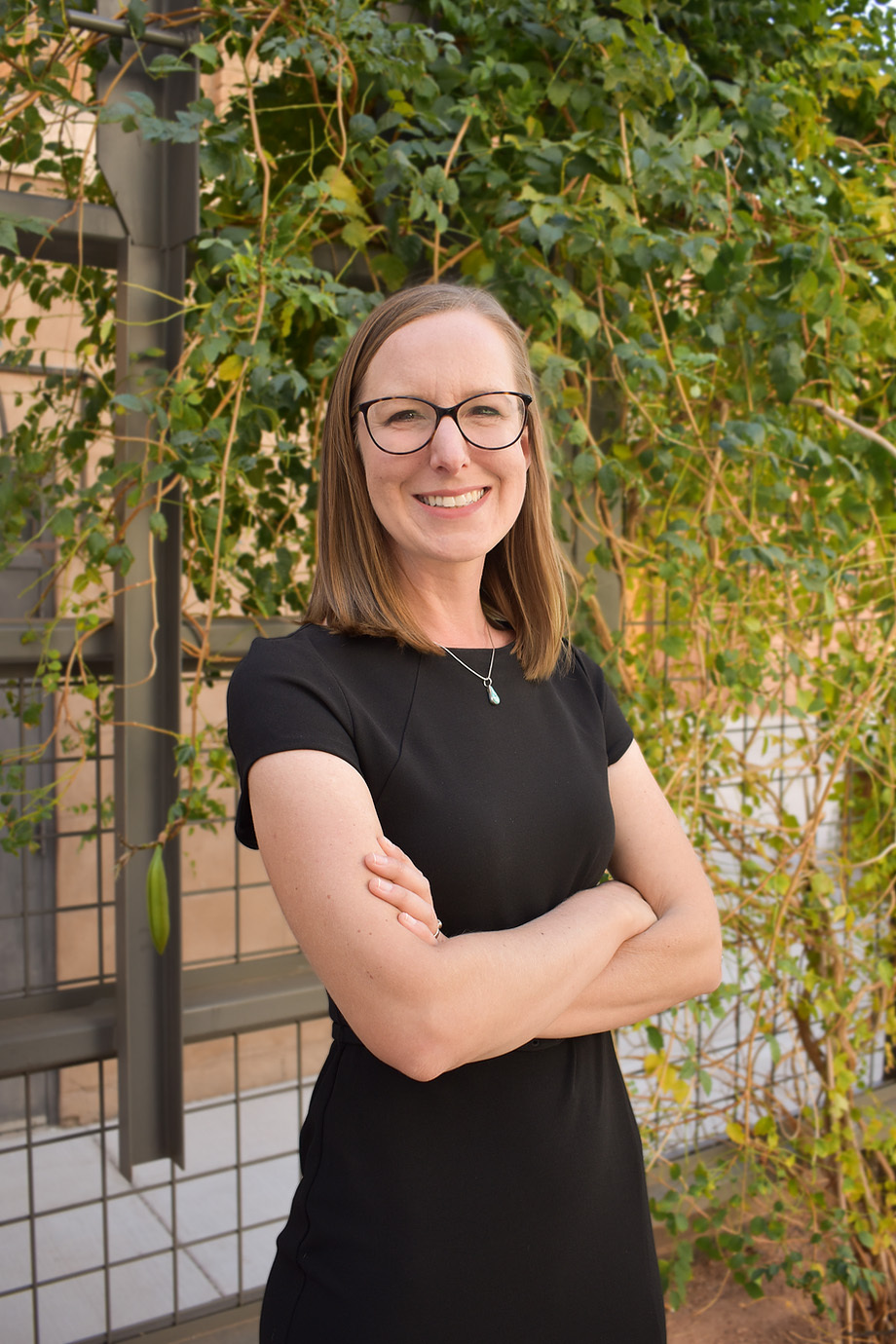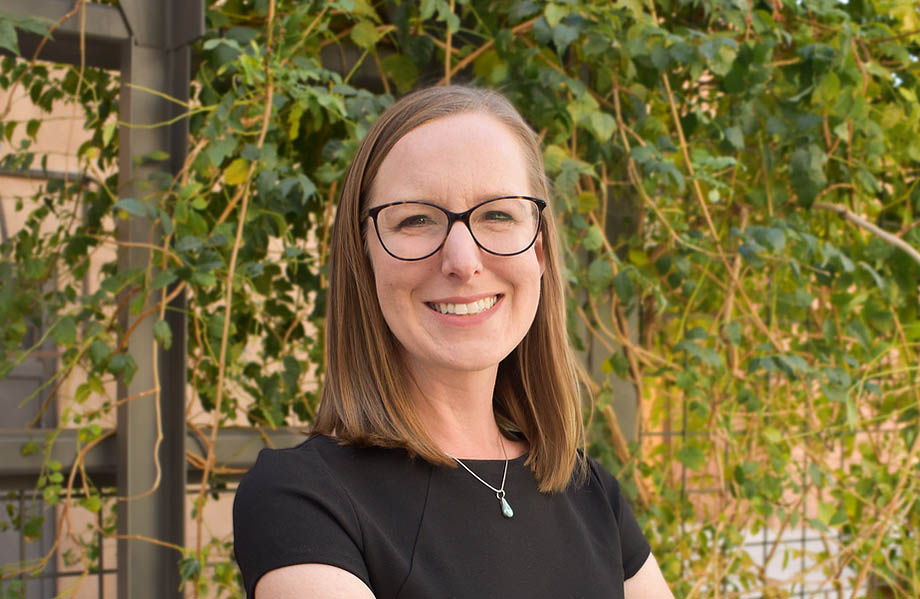Kathryn Frietze, PhD, an assistant professor in The University of New Mexico’s Department of Molecular Genetics & Microbiology, is literally trying to change medicine by researching her way toward discovering a vaccine to protect against chlamydia.
The hard work and dedication are paying off. Frietze recently received a five-year R01 grant from the National Institutes of Health in the amount of $250,000 per year, to support her efforts to develop a vaccine for chlamydia, a widespread sexually transmitted infection.
Several factors contribute to the persistent rise of chlamydia infection rates, Frietze says. “Some are supported by science, some are just hypotheses at this point.”
These include increased screenings for chlamydia, which results in catching infections without symptoms. Chlamydia is treated with antibiotics, and an unfortunate side effect of this early detection is that people are being treated for the infection before they have a chance to develop an immune response, which means they can contract chlamydia over and over.
Frietze also points out that current screening recommendations overlook half the population who are susceptible to chlamydia – and therefore capable of spreading the infection.
“Right now, the CDC recommends that all women under 25 who are sexually active, and women over a certain age if at increased risk, are screened for chlamydia annually,” Frietze says. “The recommendations are not the same for men. Heterosexual men who don’t have any other risk factors aren’t screened for chlamydia. They are tested only if they have symptoms or if they ask to be tested for it. And chlamydia is something you can spread to others, even if you don’t have symptoms.”
All these elements emphasize the importance of creating a vaccine for chlamydia, as relying solely on treating chlamydia has proven to be ineffective at stopping – or even slowing – rates of infection.
“I’ve been interested in infectious diseases for a really long time. My graduate work focused on human adenoviruses, which cause respiratory infections, and that work was more basic science-directed,” Frietze says. “Once I finished my PhD I became more interested in applied and translational research. I wanted to work more closely with research that can directly help human health.”
 Frietze did her post-doctoral fellowship in the lab of Bryce Chackerian, PhD, which brought her into the world of vaccine-related research. Since then, she’s been increasingly doing what she set out to do: contributing to the human side of science. It was as a post-doctoral fellow, working under an NIH-funded U19 grant led by Cosette Wheeler, PhD, that Frietze first began her work on chlamydia vaccines, research that she’s continued as an independent investigator.
Frietze did her post-doctoral fellowship in the lab of Bryce Chackerian, PhD, which brought her into the world of vaccine-related research. Since then, she’s been increasingly doing what she set out to do: contributing to the human side of science. It was as a post-doctoral fellow, working under an NIH-funded U19 grant led by Cosette Wheeler, PhD, that Frietze first began her work on chlamydia vaccines, research that she’s continued as an independent investigator.
“I’m very interested in women’s health in general,” Frietze says, “and chlamydia is especially a problem for women. Obviously, men get infected, too, but women tend to have the burden of disease. Chlamydia can lead to infertility, pelvic inflammatory disease and can ascend into the upper reproductive tract where it can lead to scarring in the fallopian tubes, which causes ectopic pregnancy.”
Even with the wealth of sexual health information available, chlamydia rates continue to rise, which fuels the scientific community’s interest in developing a vaccine and prompts a significant amount of funding and support for researchers from the NIH and the World Health Organization.
In Frietze’s lab, promising data is emerging demonstrating that some of their vaccines provide protections against chlamydia in female mice. Chlamydia vaccine researchers commonly focus on developing vaccines specifically for women, as they’re the patients most likely to have long-term complications from a chlamydia infection, but
Frietze believes that scope of research is too narrow.
“What we’re working on now and throughout the grant is to try and understand the mechanisms of how the vaccines are working, so we can figure out how to improve them,” she says. “As we move forward in this work, we need to develop vaccines that can also be offered to men, to protect them from infection. If we’re only targeting women, we’re only targeting half the problem.”
The broader issues at play are those of equity, vaccine justice and shared gender responsibility. In the interest of increasing parity and access, Frietze and her team are looking beyond the norms for what other chlamydia vaccine researchers usually consider, by targeting multiple anatomic sites of infection, for instance, studying male urogenital and rectal infections in animal models.
“We’re really trying to push into the field and expand how and what people are thinking about when developing chlamydia vaccines,” Frietze says.
While this NIH grant is new – it began in December 2022 – Frietze emphasizes the myriad forms of funding and support she’s received throughout her time with UNM. In addition to her work as a KL2 scholar in the Clinical & Translational Sciences Center, the Research Allocations Committee grants she’s received from the UNM School of Medicine, and additional pilot funding from UNM, Frietze says the primary reason she sticks with the University is her many years of exceptional mentorship support.
The mentoring I’ve received at UNM is why I’ve stayed here for so long. It’s a very supportive, collaborative environment . . . Being able to work in a place where I feel supported as a whole person, where I can both advance my career and live my life, has been invaluable. It takes a village.
“The mentoring I’ve received at UNM is why I’ve stayed here for so long,” Frietze says. “It’s a very supportive, collaborative environment. I’m a mom of two kids and those kids were both born while I worked here. Being able to work in a place where I feel supported as a whole person, where I can both advance my career and live my life, has been invaluable. It takes a village.”
Frietze emphasizes that she doesn’t conduct research by herself, crediting graduate and undergraduate students and her lab manager with doing the science that is essential to the work.
Frietze finds comfort in the straightforward nature of it all.
“That’s what I like about the type of research I do,” Frietze says. “There’s a very direct path. If I need to get up and give a presentation on what I do, I get to say, 'I’m working on a chlamydia vaccine.’ That’s it. That’s the goal.”
